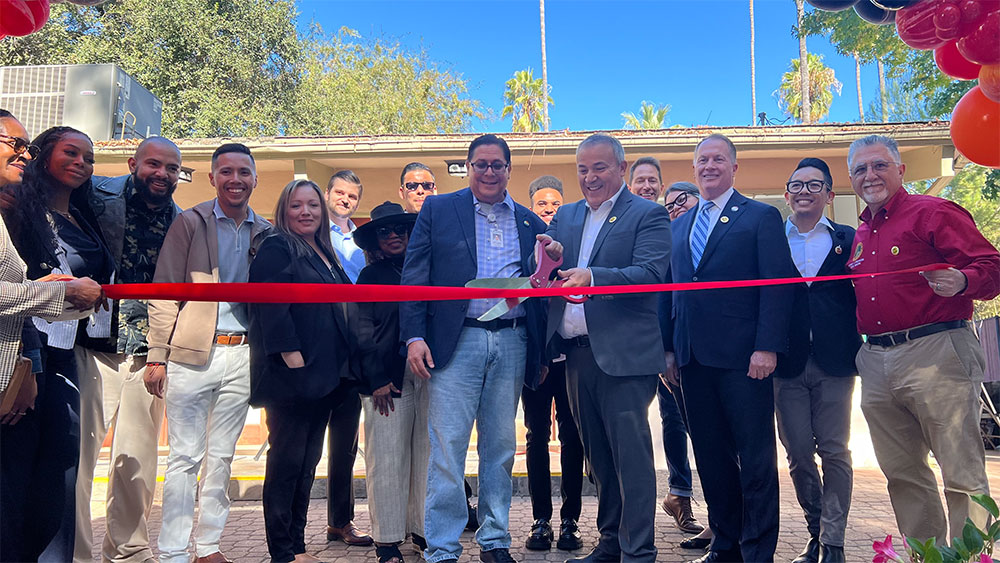NEW ALTADENA FACILITY BRINGS VITAL BEHAVIORAL HEALTH CARE SERVICES TO LOS ANGELES COUNTY
Project Provides Specialized Support for Transgender, Gender Non-Conforming Individuals
SACRAMENTO — The Department of Health Care Services (DHCS) and the Los Angeles Centers for Alcohol & Drug Abuse (L.A. CADA) expanded substance use disorder (SUD) residential treatment services at the Altadena Project in Los Angeles County to treat SUDs and co-occurring mental health needs. The facility's primary focus is to serve LGBTQIA2S+ (lesbian, gay, bisexual, transgender and/or gender expansive, queer and/or questioning, intersex, asexual, and two-spirit) individuals, with an emphasis on providing inclusive, affirming care for transgender and gender non-conforming people, especially people with low incomes, experiencing or at risk of homelessness, and with justice system involvement. The project will add 18 residential treatment beds and provide vital support for 72 adults each year.
DHCS awarded L.A. CADA more than $1.8 million through the
Behavioral Health Continuum Infrastructure Program (BHCIP), which is part of California's ongoing commitment to expand behavioral health services for all Californians. With the passage of Proposition 1,
even more behavioral health treatment facilities will be funded and built in 2025 and 2026.


Grand Opening of L.A. CADA's New Serenity House
“Los Angeles Centers for Alcohol & Drug Abuse has a proven track record of delivering vital services to people with SUDs and co-occurring mental health needs," said
DHCS Director Michelle Baass. “The opening of the Altadena Project will empower them to continue providing critical, evidence-based healing practices to an often-overlooked community – LGBTQIA2S+ individuals. We're proud to support Altadena's commitment to meeting people where they are with compassion."
THE ALTADENA PROJECT: The Altadena Project provides a broad range of supportive and therapeutic services, including individual, group, and family counseling, along with comprehensive case management. Its evidence-based treatments cover essential areas, including mental health support, recovery coaching, LGBTQIA2S+-affirming care, and peer support. The project also ensures services are accessible and respectful of cultural and language needs, and offers medication-assisted treatment (MAT) to support recovery from opioid use. Together, these services provide a well-rounded approach to long-term recovery and stability.
“We are incredibly grateful to receive this funding from DHCS through BHCIP," said
L.A. CADA CEO Juan Navarro. “This support allows us to expand and enhance our services to better meet the needs of the LGBTQIA2S+ community, with a special focus on serving the transgender community. This funding enables us to provide essential behavioral health services and reaffirms our commitment to fostering a safe, inclusive, and supportive environment for all individuals. We deeply appreciate the opportunity to make these services available and create a lasting positive impact on our community."
WHY THIS IS IMPORTANT: Through BHCIP, DHCS awards eligible entities funding to construct, acquire, and expand properties and invest in mobile crisis infrastructure to further expand the range of community-based behavioral health treatment options for people with co-occurring mental health treatment needs and SUDs. BHCIP is addressing historic gaps in the behavioral health care system to meet the growing demand for services and supports throughout the lifespan of people in need.
DHCS has awarded $1.7 billion in BHCIP competitive grants. In addition, DHCS will distribute up to $4.4 billion in competitive Bond BHCIP funding, including $3.3 billion for Round 1: Launch Ready grants as part of
Behavioral Health Transformation, DHCS' work to implement
Proposition 1. DHCS holds regular public listening sessions on this effort. Updates and recordings of the sessions are available on the
Behavioral Health Transformation webpage.
L.A. CADA: For more than 50 years, L.A. CADA has offered vital drug and alcohol rehabilitation and prevention treatment services to Los Angeles County residents who have historically faced barriers to accessing care.
ABOUT BHCIP ROUND 3: LAUNCH READY: BHCIP Round 3 supported preparation activities to plan for the acquisition and expansion of behavioral health infrastructure throughout the state. The 45 facilities were funded a total of $518.5 million to construct, acquire, and rehabilitate real estate assets to expand the behavioral health continuum of treatment and service resources. BHCIP applicants were required to demonstrate service expansion for Medi-Cal members and have a valid planning process to ensure projects are ready for implementation.